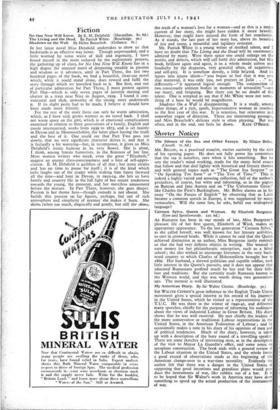Fiction
IN her latest novel Miss Delafield undertakes to show us that backwards is an effective way home. Though unpersuaded, and a little worried by some waste of skill and ingenuity, I have found myself in the main seduced by the exploratory process, the gathering up of clues, for No One Now Will Know has in a high degree the unusual merit of deepening steadily in passion and wisdom as it advances, until in Part Three, the last two hundred pages of the book, we find a beautiful, clear-cut novel which, while it could stand alone, does reward and fulfil the story through which we travelled back to it. But first, and out of particular admiration for Part Three, I must protest against Part One—which is only seven pages of juvenile musing and chatter in a train near Nice in August, 1939. I found it con- ventional and slick, unworthy of the strong story underneath it. If its slight point had to be made, I believe it should have been made more bitterly. For the rest of the story there can only be warm admiration, which, as I have said, grows warmer as we travel back. I shall not waste space on the plot, which is of emotional complications examined in relation to three generations of a family, English and creole intermarried, works from 1939 to 1872, and is set mainly in Devon and in Monmouthshire, the latter place having the truth and the best of it. One could say that Part Two goes too slowly, that no very significant character drives it, and that it is factually a bit worrying—but, in recompense, it gives us Miss Delafield's ironic humour in its very flower. She is alone, I think, among female humorists, in the firmness of her line. Most women writers who mock, even the great "Elizabeth," suggest an uneasy class-consciousness and a hint of self-appre- ciation. E. M. Delafield is guiltless of all that ; her irony strides and has no time to pause for itself ; it is of the kind which jerks laughs out of the reader while making him hurry forward all the time—and here in Devon, in 1910-14, she lets us have family and country life in the full light of her secure tenderness towards the young, the innocent, and her merciless amusement before the mature. In Part Three, however, she goes deeper. Passion is her theme here—though comedy is not absent. She builds this passion on lay figures, perhaps, but out of rich atmosphere and simplicity of manner she makes it burn. She skims rather too much, elegiacally and gently, but still she skims,
the truth of a woman's love for a woman—and as this is a major current of her story, she might have ridden it more bravely. However, that might have injured the form of her conclusion. As it stands, the last part of her story has, above its beauties of jest and scene, a .mournful arid lapidary restraint. Mr. Patrick White is a young writer of marked talent, and I have no doubt that The Living and the Dead will be enormously admired by many. Were there space one could enlarge on the merits, and defects, which will call forth this admiration, but this book, brilliant again and again, is as a whole made airless and headachy by the draperies, very graceful often of negativism and self-pity. It is somehow dowdy, a little belated. And its lapses into jejune idiom—" you began to feel that it was you that mattered, it was only you, not prayers or Julia . . ." or, differently—" it appeared logical enough. The conjunction of two consciously sentient bodies in moments of sensuality "—are too many, and fatiguing. But there can be no doubt of the talent. One is tempted to say that if Mr. White were not some- thing of a bore he would be magnificent.
Shadows On a Wall is disappointing. It is a study, among other things, of a rich, spoilt, hypersensitive woman in reaction to the first year of this war. It is sensitive, but reiterative and somewhat vague of direction. There are entertaining passages, and Miss Beauclerk's delicate style is often pleasing. But too
often, and in the end, one feels let down. KATE O'BRIEN.


























 Previous page
Previous page